|
Printables |
PowerPoints |
Online exercises |
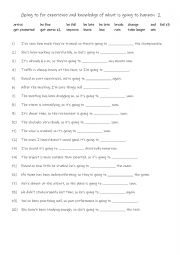
|
Going to for experience and knowledge of what is going to happen 2
First, students need to familiarise themselves with the verbs and their meanings. Then they read the sentences to see which one is required to complete the sentence. Answers on page 2.
Level: elementary
Age: 8-100
Type:
Downloads: 119
|
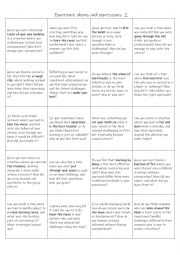
|
Experience idioms and expressions 2 B1+-C1
This is a speaking reinforcement activity to supplement the other worksheet. Students working in pairs or small groups can either ask each other the questions or answer the question themselves.
Level: intermediate
Age: 12-100
Type:
Downloads: 119
|
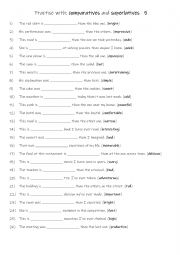
|
A1+-A2 Practise with comparatives and superlatives 5
Students read the sentence and complete the sentence with the correct form of the given adjective in (). Each form is used 13 times! Answers on page 2.
Level: elementary
Age: 8-100
Type:
Downloads: 119
|
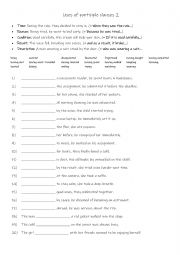
|
5 uses of participle clauses 2
Students should learn the five uses of participle clauses because they help create more concise, fluid, and sophisticated sentences. These clauses allow for the expression of time, reason, condition, result, and description in a shorter, more efficient way, making writing and speaking more dynamic and less repetitive. For example, participle clause...
Level: intermediate
Age: 10-100
Type:
Downloads: 119
|
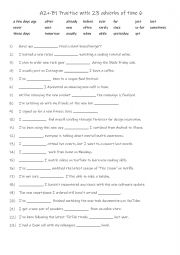
|
A2+-B1 Practise with 23 adverbs of time 6
Recognising these expressions improves listening and reading comprehension, enabling students to grasp stories, instructions, and conversations more effectively. First, students need to familiarise themselves with the 23 time expressions and their use. Then they read the sentences to work out which one is needed to complete the gap-fill. Answers on...
Level: elementary
Age: 11-100
Type:
Downloads: 119
|
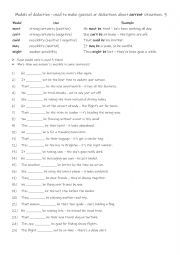
|
Modals of deduction - used to make guesses or deductions about current situations. 3
Students should learn modals of deduction because they are useful for expressing logical guesses or assumptions about present situations, helping speakers show how certain or uncertain they are. These modals, such as must, might, could, and can�t, make speech sound more natural and fluent, improve communication and reasoning skills, and are commonl...
Level: elementary
Age: 8-100
Type:
Downloads: 119
|
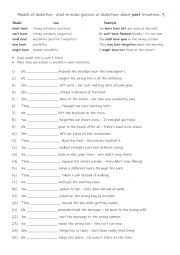
|
Modals of deduction - used to make guesses or deductions about past situations. 3
Students should learn modals of deduction because they are useful for expressing logical guesses or assumptions about past situations, helping speakers show how certain or uncertain they are. These modals, such as must have, might have, could have, and can�t have, make speech sound more natural and fluent, improve communication and reasoning skills...
Level: elementary
Age: 9-100
Type:
Downloads: 119
|
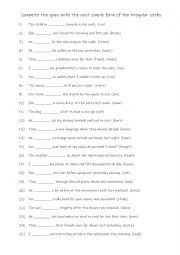
|
Complete the gaps with the past simple form of the irregular verbs
Students complete the gaps with the past simple form of the irregular verbs. Answers on page 2
Level: elementary
Age: 10-100
Type:
Downloads: 118
|
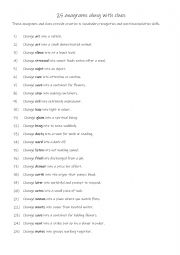
|
25 anagrams along with clues
This worksheet is suitable for A2-B1 level students. It can be used a warmer or a cooler as well and making the student develop thinking skills. The anagrams and clues provide practice in vocabulary recognition and word manipulation skills. Answers on page 2.
Level: elementary
Age: 10-100
Type:
Downloads: 118
|
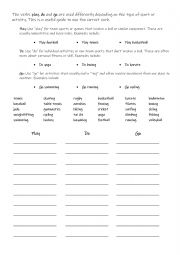
|
Sports verb rules: Play, Do & Go
The verbs play, do and go are used differently depending on the type of sport or activity. This is a useful guide to use the correct verb. Students read the rules then apply them to the 30 sporting activities. After the verbs have been checked , a speaking activity can be utilised by putting the students in pairs or small groups to ask each other: ...
Level: elementary
Age: 8-100
Type:
Downloads: 118
|
|
|
|
|












